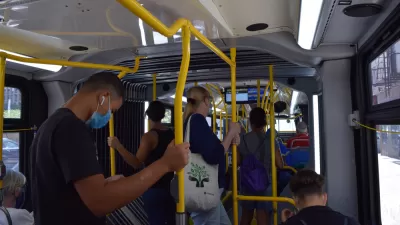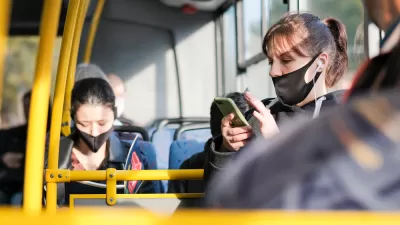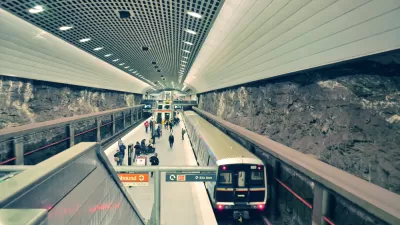Agencies can use data resources to improve their decision-making and provide more responsive service.

With transit ridership "still down about 54 percent from where it was at this time in 2019," transit agencies are turning to data and technology to explore ways to change their operations and better serve riders, writes Skip Descant.
"New Jersey Transit is partnering with the movement technology firm Replica to fold a number of data resources into planning and decision-making at the agency. The Replica data reflects localized economic activity, ridership changes on any given route, and a look at the overall mobility in an area showing not only the mode of travel, but also the purpose of the trip." Elsewhere, "the Utah Transit Authority in Salt Lake City is joining forces with community partners to offer on-demand rides for late-night workers," and "[t]he San Francisco Municipal Transportation Agency has installed temporary transit lanes on key routes 'to speed up service so that transit riders do not bear the cost of traffic congestion.'"
"In order to be resilient, transit has shown a need to think and act fast. Which is where data, and its analysis, can help," Steven Turell, chief of staff for Replica, told Government Technology. Using data, "you can actually start to optimize much more quickly for the outcomes that you want in the city."
FULL STORY: Data, Analysis Are Essential to Planning the Future of Transit

Alabama: Trump Terminates Settlements for Black Communities Harmed By Raw Sewage
Trump deemed the landmark civil rights agreement “illegal DEI and environmental justice policy.”

Planetizen Federal Action Tracker
A weekly monitor of how Trump’s orders and actions are impacting planners and planning in America.

The 120 Year Old Tiny Home Villages That Sheltered San Francisco’s Earthquake Refugees
More than a century ago, San Francisco mobilized to house thousands of residents displaced by the 1906 earthquake. Could their strategy offer a model for the present?

In Both Crashes and Crime, Public Transportation is Far Safer than Driving
Contrary to popular assumptions, public transportation has far lower crash and crime rates than automobile travel. For safer communities, improve and encourage transit travel.

Report: Zoning Reforms Should Complement Nashville’s Ambitious Transit Plan
Without reform, restrictive zoning codes will limit the impact of the city’s planned transit expansion and could exclude some of the residents who depend on transit the most.

Judge Orders Release of Frozen IRA, IIJA Funding
The decision is a victory for environmental groups who charged that freezing funds for critical infrastructure and disaster response programs caused “real and irreparable harm” to communities.
Urban Design for Planners 1: Software Tools
This six-course series explores essential urban design concepts using open source software and equips planners with the tools they need to participate fully in the urban design process.
Planning for Universal Design
Learn the tools for implementing Universal Design in planning regulations.
Clanton & Associates, Inc.
Jessamine County Fiscal Court
Institute for Housing and Urban Development Studies (IHS)
City of Grandview
Harvard GSD Executive Education
Toledo-Lucas County Plan Commissions
Salt Lake City
NYU Wagner Graduate School of Public Service





























